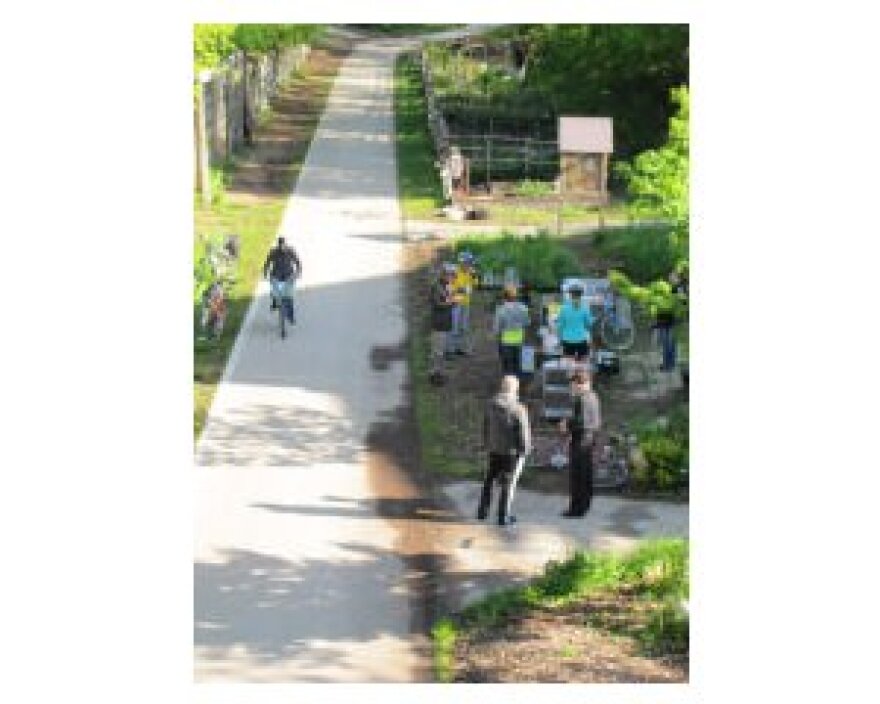You MIGHT be noticing more bicyclist pedaling along trails and streets this week.
Some of the action could be attributed to fine spring weather.
Other cyclists are being nudged into motion by National Bike to Work Week.
WUWM Environmental Reporter Susan Bence did a bit of biking and a lot of chatting to learn about the momentum behind creating a more “cycle friendly” city.

The University of Wisconsin Milwaukee is staging its own version of Bike to Work Week.
Bike to Campus Day is happening today.
Organizers reward students and staff as they roll on to campus with a free tune-up and a cup of coffee.
According to environmental sustainability coordinator Kate Nelson at least 10 percent of UWM’s faculty already commutes by bike.
She wants to build on that foundation.
Rather than focusing on streets congested with cars and buses around the eastside campus, Nelson talks up the appealing bits - such as the newly installed air pump in front of the student union for easy filling of tires and UWM’s proximity to Lake Michigan.
“We have the lakefront to ride along, we have the Oak Leaf Trail connecting to campus; we now have 13000 linear feet of bike racks on campus,” Nelson says.
That’s enough to corral 600 bikes
But creating parking space doesn’t shake off concerns about ensuring safe places to ride.
Nelson is tackling those challenges with a newly-formed bicycle advisory task force composed of faculty, staff and students – with input from an advocacy group called the Bicycle Federation of Wisconsin.
“They actually introduced me to the Five Es, which I think makes so much sense and they Five Es make so much sense. Let me try to remember, it’s encourage education, enforcement engineering and evaluation. Because if you are only addressing education, but you have terrible bike lanes, there’s potholes. Sometimes it’s just down to a culture change and I don’t think that we need an overhaul, just a nudge,” Nelson says.
Cycling enthusiast and student Kyle Schulz thinks UWM has a long way to go before it can pat itself on the back.
Schulz is doing his part to change that.
He’s one of the people checking breaks and tires on campus today.
He also runs U-Bike - a free bicycle loan program.
Schulz and a couple of student mechanics service and dispatch 60 bikes that students can borrow “free of charge” for a semester at a time. U-Bike also helps students repair their own bikes.
“This year alone we serviced 170 bikes and I’d like to see that go into the thousands,” Schulz says.
Schulz has a vision for what U-Bike could become.
“Somebody will sit down with you and teach you a route from your house that’s safe so you can commute to campus in a way that’s safe, ,” Schulz says.
Milwaukee has been taking steps to create a safer urban landscape, according to Alderman Nik Kovac.
“There’s currently 55 miles of bike trails and we have a master plan to have 150 miles. Every time we repave a street we’re looking at is this a street where it makes sense to have a bike lane,” Kovac says.
Kovac – who is often be seen cruising on two wheels – says the most effective bicycle safety strategy is based on NUMBERS..
“The safest thing for more bicyclists no matter how the street is designed is more bicyclists. If pedestrians are used to bicyclists, if cars are used to bicyclists then that’s what makes it safe,” Kovac says.
I find a woman taking her first stab at biking to work.
Nancy Morris isn’t so keen about facing city streets.
"I accidently took a wrong turn and went down a gravel construction area on the way home but my husband has corrected that on my route now and so I think I’m going to have a great day today," Morris says.
Morris says she’s one of the lucky ones who can hop onto a paved bike trail – in her case the Oak Leaf - that carries her over much of her 40 minute pedal from Whitefish Bay to the county courthouse.
"Every day that it’s nice enough for me, because I’m not quite a pro bicycler, I’m going to ride because it’s just fabulous," Morris says.
Evan Pack has made it his mission to break down barriers that keep people who work in downtown Milwaukee from commuting by bike.
"A lot of people worry about, I don’t want to leave my bike outside, or I don’t want to bring it up into the elevator," Pack says.
Pack started a nonprofit that occupies a former shoe store in the Plankinton Building.
"You can bring your bike in - it’s valet style; it’s indoor secure, we have hooks in the back room and it’s donations accepted; in other words, we’ll accept donations whatever you want to give. If you don’t have any money, that’s fine, come in – we want to see you bike into work," Pack says.
Pack isn't yet certain how many bikes he can handle, because, well, he just opened Vulture Space bicycle collective.
The newness of it all isn’t stopping him from envisioning an even wider cycling community.
Pack is collecting donated bikes and bits of bikes that he plans to piece together and get on the road.
"I don’t think you need Spandex, I don’t think you need the cycling shoes – you don’t need the fastest bike – just two wheels, just go with it," Pack says.
He hopes to attract people who never imagined themselves as bicyclists.







